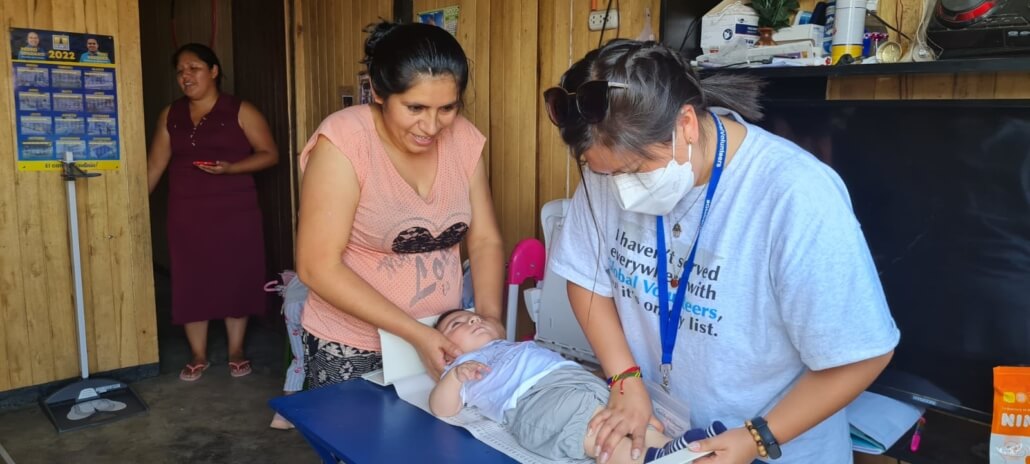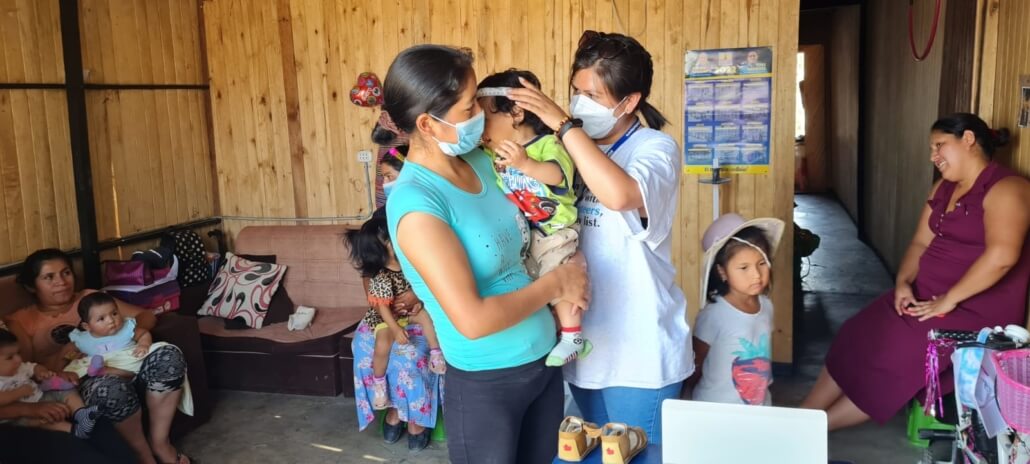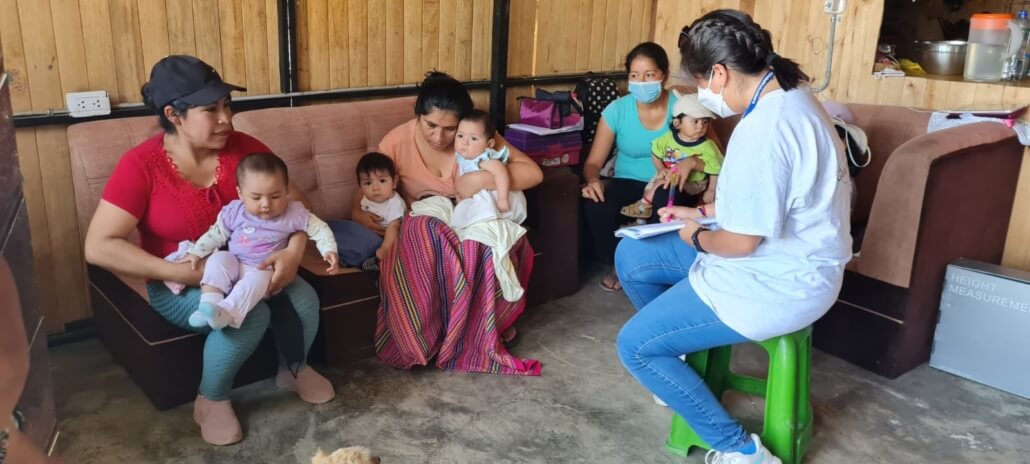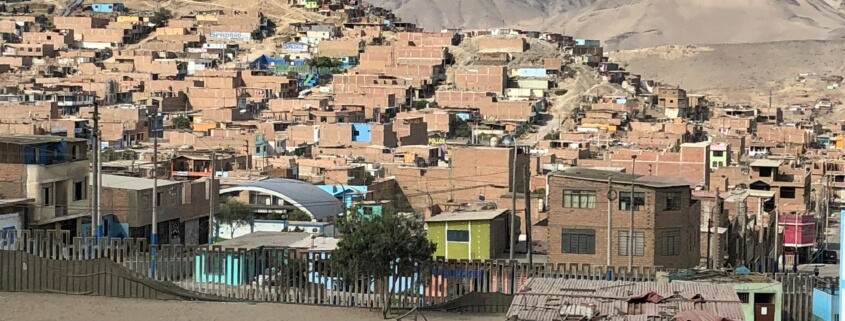Peru RCP Program Begins in Target Communities with Child Measurements
In early 2022, Global Volunteers’ Peru staff began outreach in the sandy, hilly district of Ventanilla to assess the needs of families and children to lay the foundation for the Reaching Children’s Potential Program (RCP) in Peru. This is an expansion of our existing Peru Service Program – in partnership with Sagrada Familia – Global Volunteers’ host since 2018. For generations, the indigenous communities in Peru’s Andes suffered among the highest rates of childhood stunting in the world. Often, more than half of the children in these mountaintop villages were physically and cognitively stunted. Bea Rodriguez, Global Volunteers Peru RCP Caregiver, describes how staff target areas around Ventanilla to determine the rate of stunting and assess the need for maternal and child interventions through the RCP Program.
Global Volunteers has initiated work in Pachacutec, a region north of Lima along the Pacific coast, designated as “La Pobreza Monetaria” (“monetary poverty”) by the Peruvian Government’s Institutio Nacional de Estadistica y Informatica (INEI). Families living in the neighborhoods of Nuevo Pachacutec, San Pablo, Carlos Garcia Ronceros and Zona Industrial struggle with high unemployment, poverty, poor health and nutrition, low school attendance and illiteracy. This is where RCP can have the greatest impact.
In Peru, the monetary poverty rate is the proportion of households in barrios where basic foodstuffs, housing, clothes, education, healthcare, and transportation are beyond families’ capability. At last estimation in 2018, 33 to 42 percent of families in our target areas fell below the monetary poverty line.

Our preliminary efforts focus on children’s development and physical growth, generally defined as stunting. Globally, stunting prevalence tends to be higher in impoverished areas, and is defined as the impaired growth and development that children experience from poor nutrition, repeated infection, and inadequate psychosocial stimulation. Children are defined as stunted if their height-for-age is more than two standard deviations below the World Health Organization (WHO) Child Growth Standards median.
In the barrios, we measure the length/height of children from ages 0 to 5 to gain a better understanding of the prevalence of stunting in these specific areas, and compare that data to WHO median height charts. If a child’s height or length is two standard deviations below the median height for children their age, they are stunted. We then compare the number of stunted children to the total number of children measured in that same area to estimate what proportion of the population may be stunted.
A Day in the Life of an RCP Caregiver in Peru
After contacting various community leaders and community organizations to establish trust and mutual respect, we began collaborations with food distribution and social assistance organizations such as “ollas comunes” (family food co-ops), “Vasos de Leche” (a school milk program), comedores populares (“common kitchen”), pronoei (non-school programs) and some kindergartens. These community programs have been instrumental in helping connect Global Volunteers staff to mothers and children who recognize the value of education and technology presented by the RCP Program. We’ve been doing our outreach for several months already, and have much more to do to introduce Global Volunteers and explain the RCP program in more neighborhoods. Currently, our staff plans to collect between 150-200 additional measurements from children living in the specific target areas. After this finished, we will be able to conduct a more in-depth analysis to look for any interesting trends in the data.
When the parents invite us into their communities, we answer their questions and conduct a brief data interview to learn their name, age, address, phone number, number of children and the ages and birth dates of the child(ren) to be measured.

Some parents ask if the child is well, since due to the pandemic, many have not yet gone to the “Posta,” (health center ) or hospital for a check-up. In addition, parents sometimes mention that their children have been diagnosed with anemia or other illnesses, or they have behavioral problems and want to know what they can do. We always try to answer all their questions. Many women are single parents and tell us they have no money for health care. I take a little more time to listen to them and try to give them some tips that may help them. For instance, on a recent day, the mother of a 5-year-old child said her son doesn’t want to eat and now is upset all the time. The mother also mentioned feeling “annoyed” with herself, as it hurts her that her son is getting thinner and thinner. I explained that between a child’s 4th and 5th birthday, sometimes children’s tastes change, and offered her ideas for foods she can cook to encourage his appetite. I urged her to go to a health center for a better evaluation of the child, and assured her she wasn’t doing anything wrong. She thanked me, saying she hopes to learn from the future RCP workshops, because she has five children and she doesn’t want any of them to get sick.
The word is spreading throughout the region! Many parents are eager for the workshops to begin, and refer us to other parents and community groups. It’s important to them because few organizations come to these areas of Pachacutec, and they believe that education is fundamental to the development of their children and family. However, they mention that they would like to have some type of therapy or psychological orientation, dental care, eye exams and especially anemia screening, as these are top problems in the area.

About RCP Objectives and Outcomes
Global Volunteers’ Reaching Children’s Potential Program began in St. Lucia in 2012 to demonstrate the value of short-term volunteers on a comprehensive development project focused on children’s physical growth and cognitive development, with a focus on the first 1,000 days of life. The outcomes became the foundation for the Tanzania RCP Program, an expanded child-focused, parent-driven, family-centered, and community-led comprehensive effort beginning with pregnancy, and continuing through the 18th birthday,
The purpose of expanding the program to Peru is to demonstrate how the research model can be adapted to deliver similar outcomes in different conditions and populations world-wide, while maintaining the delivery system of volunteers and available local resources to meet the diverse needs of local families.
To help children reach their full potential, mothers must care for themselves from the moment of their baby’s conception. That’s obvious to most of us, but women in many areas around the world are often the second and third priorities in a family, behind men and elders.
Global Volunteers works with local leaders in our partner communities to recognize mothers for all the critical roles they play, and to provide essential services to them and their unborn and living children.




Leave a Reply
Want to join the discussion?Feel free to contribute!